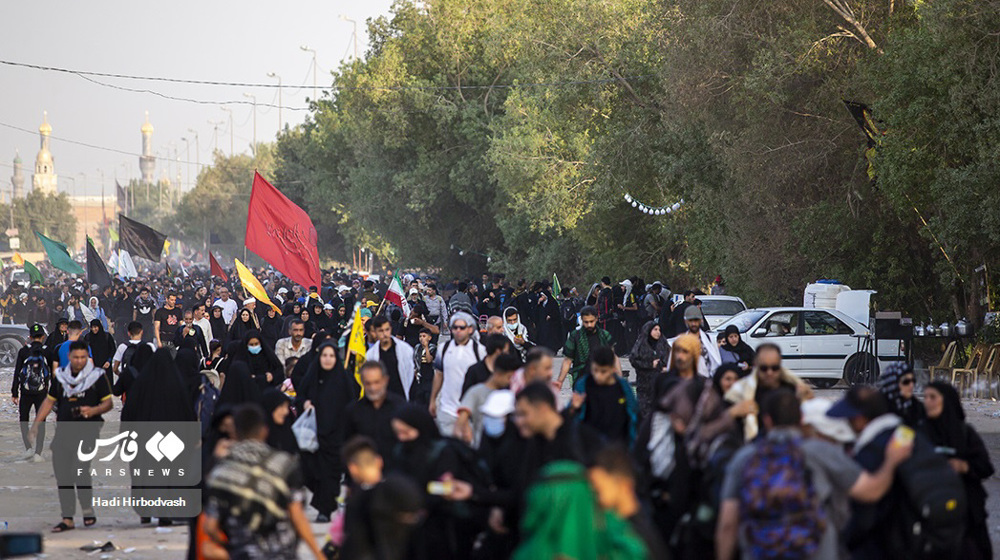Millions of Shia Muslims even non-Muslims from dozens of countries are converging on the Iraqi holy city of Karbala to commemorate Arba’een, the 40th day after the martyrdom anniversary of Imam Hussein (AS), the third Shia Imam.
For at least two weeks, pilgrims from countries including Iran, Azerbaijan, Bahrain, Kuwait, and Saudi Arabia, have been arriving in the city, located about 100 kilometers (62 miles) southwest of the Iraqi capital of Baghdad, with tens of thousands coming before the actual day of Arba’een, which falls on September 17 this year.
Pilgrims travel to the holy city in order to have a chance to touch the gilded grille that surrounds Imam Hussein’s tomb and slip messages through the bars.
They carry their belongings in backpacks or bags perched on their heads as they are moving toward Karbala on foot from different directions. Many young men carry tents so that they can sleep on the streets.
Street signs are put up in Farsi as well as Arabic for millions of Iranians among the crowd.
According to the Head of Iran's Arbaeen Central Headquarters Seyed Majid Mir-Ahmadi, it is estimated that 2.6 million Iranian nationals have so far crossed Iranian land border crossings into Iraq, and the process is going on smoothly following several days of hiatus.
“We are nicely managing the arrival and departure of pilgrims,” he emphasized, noting that “Thank God Iranian officials could efficiently handle the increased congestion of pilgrims at border crossings. Currently, the situation is favorable and all pilgrims are crossing into Iraq.”
Mir-Ahmadi stated that 600,000 Iranians have also returned back to the country.
Traffic is moving steadily at border crossings, and the entry and exit of pilgrims are done easily, he added.
Every year on Arba’een, millions of people from around the world flock to Karbala. Large groups of mourners travel on foot toward the holy city to take part in the largest annual Islamic gathering on earth.
Imam Hussein (AS) and his 72 companions were martyred in the Battle of Karbala in southern Iraq in 680 AD after fighting courageously for justice against the much larger army of the Umayyad caliph, Yazid I.
/129
For at least two weeks, pilgrims from countries including Iran, Azerbaijan, Bahrain, Kuwait, and Saudi Arabia, have been arriving in the city, located about 100 kilometers (62 miles) southwest of the Iraqi capital of Baghdad, with tens of thousands coming before the actual day of Arba’een, which falls on September 17 this year.
Pilgrims travel to the holy city in order to have a chance to touch the gilded grille that surrounds Imam Hussein’s tomb and slip messages through the bars.
They carry their belongings in backpacks or bags perched on their heads as they are moving toward Karbala on foot from different directions. Many young men carry tents so that they can sleep on the streets.
Street signs are put up in Farsi as well as Arabic for millions of Iranians among the crowd.
According to the Head of Iran's Arbaeen Central Headquarters Seyed Majid Mir-Ahmadi, it is estimated that 2.6 million Iranian nationals have so far crossed Iranian land border crossings into Iraq, and the process is going on smoothly following several days of hiatus.
“We are nicely managing the arrival and departure of pilgrims,” he emphasized, noting that “Thank God Iranian officials could efficiently handle the increased congestion of pilgrims at border crossings. Currently, the situation is favorable and all pilgrims are crossing into Iraq.”
Mir-Ahmadi stated that 600,000 Iranians have also returned back to the country.
Traffic is moving steadily at border crossings, and the entry and exit of pilgrims are done easily, he added.
Every year on Arba’een, millions of people from around the world flock to Karbala. Large groups of mourners travel on foot toward the holy city to take part in the largest annual Islamic gathering on earth.
Imam Hussein (AS) and his 72 companions were martyred in the Battle of Karbala in southern Iraq in 680 AD after fighting courageously for justice against the much larger army of the Umayyad caliph, Yazid I.
/129

